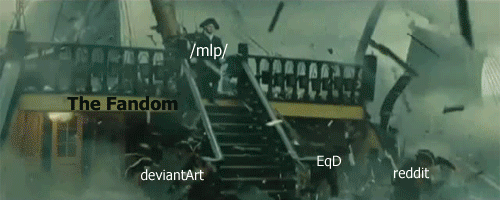Il finale, mindfuck massimo con fanservice (mi ha fatto impressione vedere 'al contrario' la sequenza di inizio del primo Bioshock), molto bello da vedere, ma onestamente ci sono rimasto malissimo quando affogano Booker

Il Dottore sarebbe felice di tutta quella "wibbly wobbliness" multidimensionale, ci ho impiegato un pò a capire la sequenza degli eventi. Poi la sequenza post-credit con finale aperto... Non so se mi ha messo più speranza o angoscia nel vedere cosa c'era dentro la culla (cosa che non si è vista, quindi alla fine ansia 'sospesa')
Non ho capito comunque come mai i Lucete hanno voluto liberare Anna (in base ad un Voxofono, pare di capire fosse una risposta ad una minaccia di Comstock) e come mai Comstock voleva tenere segregata Elizabeth pur sapendo che di fatto era sua figlia, per proteggerla da Booker? Spiegherebbe come mai aveva potuto preparare in anticipo il 'brand' del Falso Profeta (AD).
AAAAAAAAAAAAGH. Mindfucks everywhere.
Comunque, ambientazione fantastica, con una profondità sconvolgente, che mette in luce le pecche dell'umanità: fanatismo, dipendenza da leadership carismatiche, schiavitù e razzismo, vendetta cieca (la rivoluzione del Vox Populi va oltre la ricerca di libertà, trasformando le vittime in carnefici sadici). Tutti i parallelismi con la storia, le società e le religioni sono lodevoli ed affascinanti. E ovviamente hanno creato controversie tra persone bigotte.
BioShock Infinite's themes of racism, extreme religion and an ideological society have caused controversy. In the various reveals of the Founders and Vox Populi before release, Levine and Irrational Games were criticized by various groups; upon demonstrating the Founders, people that favored the ideals of the Tea Party including Levine's relatives felt the game was attacking that movement; on the announcement of the Vox Populi, Levine found some websites claiming the game was an attack on the labor movement, and one white supremacist website claimed that "The Jew Ken Levine is making a white-person-killing simulator." Levine considered that Infinite, like BioShock before it, was a Rorschach test for most people, though would be taken negatively in nature and upset them, as his vision in crafting the stories was "about not buying into a single point of view".
Zachary Comstock's portrayal as a zealot has also been deemed to offend "gamers with strong religious backgrounds," as a member of the BioShock Infinite development team even threatened to resign over the game’s ending,[205] believing the game was saying "Being religious causes you to be evil." Comstock was altered after Levine spoke with this developer, who helped Levine to reconsider the notion of forgiveness in the New Testament and set to figure out why people came to follow Comstock and to understand the ecstatic religious experience they would be seeking. Levine did not consider this reinvention of the character to be censorship, instead a means to present the story better to a broad audience. In another case, a player that considered himself a "devout believer" of Christianity was strongly upset with the forced baptism that Booker receives prior to entering Columbia proper, prompting him to request a refund from Valve due to being unaware of this content in the game. Particia Hernadez of Kotaku considered that the baptism scene was "admirable" in the context of video games as an art form, as the scene created numerous responses and controversy on social media.Ho anche molto apprezzato, leggendo a posteriori, come è stato sviluppato il gioco, in particolar modo l'interazione con i Voice Actor. Troy Baker che suona la chitarra, updated as man-crush

I 'gemelli' Lucete comunque sono fottutamente geniali. TUTTO è fottutamente geniale

 Ricordo ancora la sua frase quando fa "Savage Wolf Fury".
Ricordo ancora la sua frase quando fa "Savage Wolf Fury".
 Ricordo ancora la sua frase quando fa "Savage Wolf Fury".
Ricordo ancora la sua frase quando fa "Savage Wolf Fury". !
! ) e stupenda la storia.
) e stupenda la storia.















 si lo so ke sono stata esagerata ... ma sono utili vero ...
si lo so ke sono stata esagerata ... ma sono utili vero ...  il fatto è ke non le so fare, o almeno ne faccio massimo 2 per gara!
il fatto è ke non le so fare, o almeno ne faccio massimo 2 per gara! 



